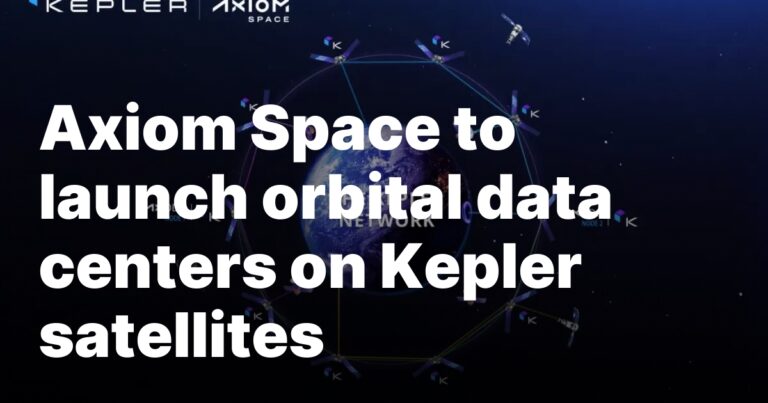COLORADO SPRINGS — Axiom Space will fly two data centers on Kepler Communications satellites as the next step of its efforts to develop space-based cloud computing services that will leverage its work on commercial space stations.
Axiom announced April 7 it will fly two of its Orbital Data Center (ODC) nodes on satellites that are part of a network of optical data relay satellites being developed by Kepler for launch to low Earth orbit before the end of the year. The nodes will be able to communicate with other satellites in the Kepler network as well as any other spacecraft that use optical terminals compliant with standards developed by the Space Development Agency.
The nodes, Axiom said, will enable real-time processing of data from other satellites as well as use of artificial intelligence models to analyze such data. The system can also provide what the company calls “Earth-independent endpoint detection and response” capabilities for cybersecurity.
Axiom Space has been working on orbital data processing concepts for several years, including flying an Amazon Web Services edge computing to the International Space Station in 2022. Axiom is working with Red Hat to fly a prototype data processing unit to the ISS this spring.
Those projects are what the company considers building blocks to develop what Axiom calls “scalable orbital data center infrastructure,” said Jason Aspiotis, global director of in-space data and security at Axiom, in an interview. The ODC nodes on the Kepler satellites will be first fully functional systems.
Axiom has not disclosed any customers yet for its Orbital Data Center nodes. “We have agreements and an array of customers in negotiations for both the first two nodes and future capacity,” he said.
Those customers, he said, include those interested in commercial, civil and national security applications of the system. That included Earth observation companies interested in faster processing of imagery and government agencies seeking data processing for space domain awareness. The capability could also support the proposed Golden Dome missile defense system.
That will expand over time, Aspiotis predicted, as the company adds capacity. “The next level of infrastructure is to provide space-based cloud services down to the ground,” he said, including for companies in industries outside of space. “There’s lots of use cases where space-based cloud has benefits.”
Axiom has the option to install ODC nodes on additional future Kepler satellites, but the company expects to eventually move to even larger systems. “That’s where we start looking into space station class infrastructure,” he said. “We’ll have a lot more real estate, a lot more power, a lot more thermal management to bring about large amounts of compute.”
That will leverage capabilities Axiom is developing for commercial space stations, the effort the company is best known for. “That’s why Axiom is also very interested in this, because we are at the forefront of building large-scale space infrastructure,” he said.
Those future facilities won’t be identical to Axiom’s planned space station. “Data centers don’t need life support and don’t need to be human rated,” he said. “So, they will be a bit simpler, but the foundational building blocks of large-scale infrastructure are common and modular between space stations and orbital data centers.”

